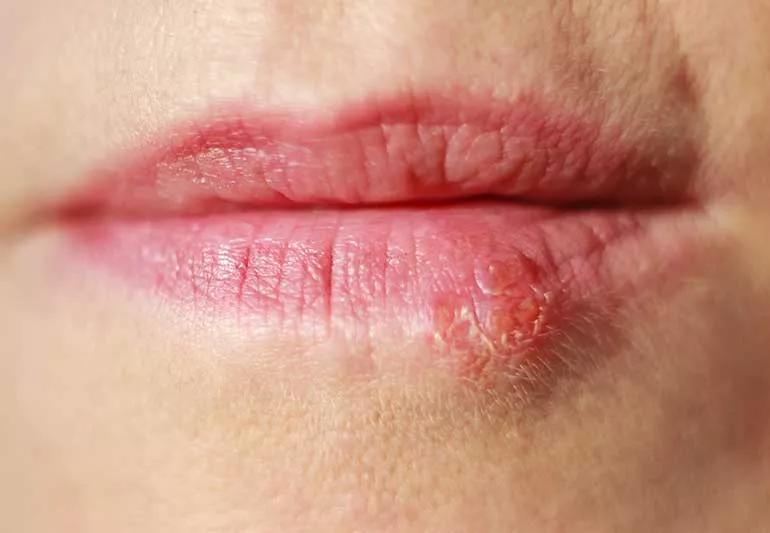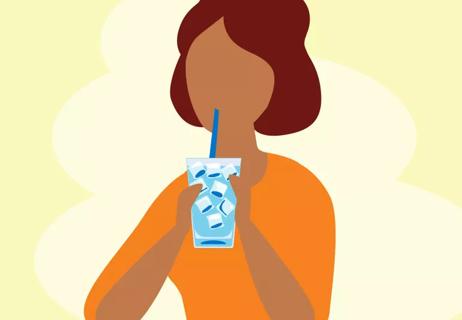Clogged or inflamed pores cause one; a contagious virus causes the other

You wake up to an uncomfortable bump on your lip. Could it be a cold sore? Could it be a lip pimple?
Advertisement
Cleveland Clinic is a non-profit academic medical center. Advertising on our site helps support our mission. We do not endorse non-Cleveland Clinic products or services. Policy
While both have similarities, there are ways you can tell what you’re dealing with.
In the case of a cold sore versus a pimple on your lip, dermatologist Vickie Baker, MD, explains what to look for and how to treat each.
From where it’s located, to how it looks and feels, Dr. Baker shares the differences between a cold sore versus a pimple on your lip:
A lip pimple may appear in the corners of your mouth or along the border of your lipline. It could be a pimple on the skin area (flesh-colored, not the red area) of your upper lip or lower lip.
A cold sore, which is also known as fever blisters, oral herpes or herpes labialis, tends to show up in the same place each time it occurs, on any part of your lip, the skin area or the red area.
“Cold sores can develop along your upper and lower lip, possibly both at the same,” says Dr. Baker.
A lip pimple forms a raised red bump, which may have a whitehead or a blackhead in its center.
A cold sore, which is a fluid-filled blister or cluster of blisters, typically starts out red and swollen. Within two to three days, it will start to ooze a clear or slightly yellow fluid, and after a week of its appearance, it’ll crust over and scab. Cracking and bleeding as the cold sore heals is common.
Advertisement
While a lip pimple is the same as any other pimple you may get on your face, due to the amount of nerve endings in and around your lip, it may cause pain.
But with a cold sore, tingling and a burning feeling are more typical. “It’s common to feel burning, itching and tingling when you have a cold sore,” notes Dr. Baker. “In fact, you may notice a tingling sensation prior to the blister forming on your lip.”
Lip pimples, which aren’t contagious, are caused by clogged pores or inflammation that occur due to:
The herpes simplex virus type 1 (HSV-1), which is a very common, highly contagious virus, causes cold sores. Once you’ve been infected with HSV-1, the virus never goes away.
“You can spread cold sores through your saliva or close contact,” warns Dr. Baker. “Activities like kissing or sharing items like straws, towels or lip balm can cause a cold sore.”
If you have a lip pimple, you can apply a skin care product that contains benzoyl peroxide or salicylic acid. These ingredients will help unclog your pores, kill bacteria and reduce inflammation. A healthcare provider may also suggest taking an oral antibiotic for lip pimples that won’t go away.
If you have a cold sore, there are several over-the-counter medications that come in ointments or creams that can be applied directly to the area. And if you use these treatments when you first notice any tingling, burning or itching, you can shorten the healing time. Your healthcare provider may also prescribe an oral or intravenous (IV) antiviral medication.
For both, applying a cold compress to the area for a few minutes throughout the day can help with pain and swelling.
There are several things you can do to prevent both cold sores and lip pimples.
A simple, basic skin care plan can help you prevent a lip pimple from forming. Make sure you wash your face twice a day, taking care to clean the area around your lips. A gentle exfoliating cleanser can also help.
“And it’s especially important that you wash your face after you finish working out or any other activity where you sweat,” advises Dr. Baker.
When it comes to cold sores, make sure you don’t kiss or have intimate contact with someone you know who has a cold sore.
“You should avoid sharing items like towels, razors, dishes, cutlery or lip products,” says Dr. Baker. “And make sure you wash your hands before touching your lips, eye or genitals.”
Advertisement
Stress and a weakened immune system can trigger a cold sore, too. Try eating a healthy diet or seeing a nutritionist and practicing mindfulness to help keep stress at bay.
“The sun can also bring out a cold sore,” cautions Dr. Baker. “Make sure you use a lip balm that has at least SPF 30.”
Advertisement
Learn more about our editorial process.
Advertisement

These common mouth sores are very different — cold sores are caused by a virus and are contagious, but canker sores aren’t

This medicated liquid is available by prescription only and is specially formulated for your specific needs

Lots of things can activate the herpes simplex virus, from the common cold and cold weather to cracked skin and cosmetic procedures

This oral health practice doesn’t have proven benefits, and it’s not a substitute for brushing and flossing

Prescription oral antivirals are your best bet, but OTC creams can help, too

Stay hydrated, use a humidifier and try sugar-free candies or over-the-counter products with xylitol

Non-cancerous ulcers usually heal within a few days or weeks — if it’s sticking around, it’s time to get it checked

Get quick relief with ice chips, popsicles, milk and saltwater

The tropical fruit is a good source of antioxidants and vitamin C

Most people fall asleep within 10 to 20 minutes, but if your experience is different, adjusting your sleep schedule may help

Exploring your hidden side can lead to better understanding of what makes you tick